- Home
- George Orwell
Orwell in Spain Page 5
Orwell in Spain Read online
Page 5
3. Exchange rates were suspended during the civil war. In January 1936 there were 36 pesetas to the pound, and in January 1940, 39 pesetas. Eileen writes of using ‘credit at 60 to the £’. At 60, 2,000 pesetas would cost just over £33; at 36, £55 11s. Presumably Eileen hoped for more than 60.
[368]
Extract from letter to Victor Gollancz
On 1 May 1937, Orwell wrote to Gollancz from Barcelona to thank him for his introduction to The Road to Wigan Pier, which he had first seen about ten days earlier. Since then he had been slightly ill and ‘then there was 3 or 4 days of street-fighting in which we were all more or less involved, in fact it was practically impossible to keep out of it’. He concludes:
I shall be going back to the front probably in a few days & barring accidents I expect to be there till about August. After that I think I shall come home, as it will be about time I started on another book. I greatly hope I come out of this alive if only to write a book about it. It is not easy here to get hold of any facts outside the circle of one’s own experience, but with that limitation I have seen a great deal that is of immense interest to me. Owing partly to an accident I joined the P.O.U.M. militia instead of the International Brigade,1 which was a pity in one way because it meant that I have never seen the Madrid front; on the other hand it has brought me into contact with Spaniards rather than Englishmen & especially with genuine revolutionaries. I hope I shall get a chance to write the truth about what I have seen. The stuff appearing in the English papers is largely the most appalling lies – more I can’t say, owing to the censorship. If I can get back in August I hope to have a book ready for you about the beginning of next year.
1. The International Brigade was composed of foreign volunteers, mostly Communist, and played an important part in the defence of Madrid. Its headquarters was at Albacete.
[369]
Orwell’s Wound
Orwell was shot through the throat by a sniper on 20 May 1937. He discusses the incident in Homage to Catalonia, pp. 131–3 [VI/137–9]. Eileen sent a telegram from Barcelona at noon on 24 May 1937 to Orwell’s parents in Southwold. This read: ‘Eric slightly wounded progress excellent sends love no need for anxiety Eileen.’ This reached Southwold just after 2 p.m. Orwell’s commandant, George Kopp, wrote a report on his condition on 31 May and 1 June 1937. When this report was lost (see Eileen’s letter to her brother, c. 10 June 1937, below), Kopp wrote another, for Dr Laurence O’Shaughnessy, Orwell’s brother-in-law, dated ‘Barcelona, the 10th. of June 1937’ (see below). It differs slightly from the version given in Orwell Remembered, 158–61. Kopp illustrated his report with a drawing of the bullet’s path through Orwell’s throat; Bert Govaerts, who uncovered details of Kopp’s life, suggests that this shows his training in engineering drawing. Kopp’s report is in the British Library, Mss Add. 49384, and is reproduced by kind permission of the Trustees. The slight errors in Kopp’s English have been corrected.
Eric was wounded the 20th of May at 5 a.m. The bullet entered the neck just under the larynx, slightly at the left side of its vertical axis and went out at the dorsal right side of the neck’s base. It was a normal 7 mm bore, copper-plated Spanish Mauser bullet, shot from a distance of some 175 yards. At this range, it still had a velocity of some 600 feet per second and a cauterising temperature. Under the impact, Eric fell on his back. The hemorrhaging was insignificant. After dressing at a first aid post some half a mile from the actual line, he was transferred to Barbastro and then to the Hospital of Lérida, where I saw him with Eileen some 50 hours after his having been wounded.
Eric’s general state was some sort of excellent; the temperature (taken in the left arm-pit) had never reached 37°C. Eric complained about his right arm aching from the shoulder down to the tip of the middle finger along a humero-cubital line and about a pain, according to himself severe but not unbearable, in the left side some where between the ultimate rib and the spleen. His voice was hoarse and feeble, but covering all the practical purposes of conversational speech. Breathing absolutely regular. Sense of humour untouched.
At the Hospital in Lérida, Eric only received an external treatment of his wound. After a couple of days, the dressing of the entrance wound could be dispensed with. He remained at this Hospital, under care of Dr. Farré, up to the 27th when he was transferred to Tarragona.
Dr. Farré told me on the 22d of May that no essential organ had been touched by some sort of unexplainable luck; he admitted that the pain in the arm might be produced by abrasion of one of the arm’s main nerves and that the pain in the left side was probably due to hitting the ground when falling from his tremendous height. He told me that there was nothing to fear about the basic wound.
We had Eric ordered to be evacuated from Tarragona to Barcelona and went to fetch him the 29th of May; we found him with a semi-complete aphorisia1 and a slight fever. The pain in the left side had disappeared in due course. The one in the arm (supposed of nervous origin) subsisted unchanged. The doctor at Tarragona’s Hospital had told Eric on that very morning that his larynx was ‘broken’ and that he would never recover a normal voice. In fact, Eric was able to utter any articulate sound but feebly and with the characteristic, grinding, noise of the brakes of a model T, very antiquated, Ford; his speech was inaudible outside a range of two yards.
Eric reached the sanatorium Maurín in Barcelona on the 29th at 10 p.m., having travelled 60 miles in a saloon-car without any special accommodation. His temperature reached at 11 p.m. 37.8°C (in left armpit); he received an aspirin and went immediately to bed, without any meal.
On Sunday, 30th, his voice had improved considerably, his temperature was normal in the morning and his appetite restored. He was able to walk about the place and its park without any exhaustion. I saw him from 11 a.m. to 6 p.m. and found his voice and spirits continuously improving during this period. Eileen was with her husband all the time and states his comportment was absolutely peace-timely.
Today, 30th.2 Eric travelled by tram and tube, on his own initiative, down to the Centre of Barcelona, where I met him at 11.45 a.m. He explained his escapade by the want of cocktails and decent lunch, which were duly produced by Eileen’s tender care (with help of a barman and several waiters).
Eric’s temperature had remained normal, the pain in the left side had not reappeared and the pain in the right arm was rather reduced. His voice, according to himself, had improved since yesterday, but Eileen and I don’t share this impression, without thinking it was worse. I explain this apparent contradiction by the fact that to reach his present quality of speech costs him less effort than yesterday.
I arranged to have Eric thoroughly examined to-morrow morning by Professor Grau of Barcelona’s University and for a subsequent treatment either by some professor, or by another prominent specialist of this town.
I propose to add to this ‘bulletin’ Professor Grau’s opinion with the narrative of the manipulations he will perform on my friend’s throat.
Professor Grau examined Eric to day, 1st of June, at 9.30 a.m. at the ‘Hospital General de Cataluña’. His diagnostic is:
‘incomplete semi-paralysis of the larynx due to abrasion of the right-side larynx dilating nerve.’
He confirmed Dr. Farré’s statement that no essential organ had been touched; the bullet went right through, between the trachea and the carotid.
Professor Grau said that electrotherapy was the only thing to be recommended just now and some sort of promise to restore Eric’s voice in a long, indefinite, but reasonable time.
He took Eric to Dr. Barraquer, specialist in electric treatments of nervous disturbances and began by having a private talk of some 12 minutes with his colleague. It is unknown if they spoke of Eric’s wound or of some other topic. When Eric, Eileen and myself were ushered in Dr. Barraquer’s study, Professor Grau explained the case just as if he had never spoken of it before and wanted his friend to investigate any possible nervous lesions outside of the purely laryngic zone out of which he somehow sort of
hated to talk.
Dr. Barraquer’s additional diagnostic was: ‘abrasions of the first right-side spinal rachidean nerve,’ which accounts for the pain in the arm. Dr. Barraquer also advocated electrotherapy for both of the nervous lesions and it was agreed upon Eric coming twice a week (on Wed. and Fri.) to have an electrical treatment and once a week (on Fridays) to let Professor Grau look into his throat and hear him saying ‘aaaaaah’ whilst his tongue is maintained stretched out at full length by the Professor.
Both of the doctors concerned with the case are decent, efficient and fully civilised people, with a lot of similar cases having passed before them since war began; the machinery and installations of the General Catalonian Hospital is complete and modern; most of the nurses are brunettes.
Of course, the doctors have not given any definite opinion upon the duration of the treatment and I felt I could not possibly put any questions about it before they can prove by some sittings the effect of electrotherapy on Eric’s nerves. I think that in any case, it would be advisable to let the treatment go at least two weeks and then ask the medical people ‘what about having it continued in England?’.
I advocate you writing to Dr. Barraquer (who speaks a fairly good English) a ‘colleague’s letter’ in the reply to which you may be told something more than we, mere mortals, are admitted to hear.3 Then you would be able to form a reasonable opinion about the case and send Eileen definite instructions which, I am sure she will follow without any reluctance, so high is her admiration for your professional capacities.
With the hope I shall some day have the opportunity of sharing this feeling not only from faith but on experimental evidence, I remain
Yours sincerely
Georges Kopp
1. Kopp meant ‘aphasia’.
2. Presumably 31 May.
3. Kopp provided Barrequer’s address.
[371]
To Cyril Connolly
8 June 1937 Handwritten
Sanatori Maurín,1 Sania, Barcelona
Dear Cyril,
I wonder if you will be in town during the next few weeks. If you will & would like to meet, you might drop a line to that effect to
at. 24 Crooms Hill
Greenwich S.E.10.
If I can get my discharge papers I ought to be home in about a fortnight. I have been nastily wounded, not really a very bad wound, a bullet through the throat which of course ought to have killed me but has merely given me nervous pains in the right arm & robbed me of most of my voice. The doctors here don’t seem certain whether I shall get my voice back or not. Personally I believe I shall, as some days it is much better than others, but in any case I want to get home & be properly treated. I was just reading one of your articles on Spain in a February New Statesman. It is a credit to the New Statesman that it is the only paper, apart from a few obscure ones such as the New Leader, where any but the Communist viewpoint has ever got through. Liston Oak’s article2 recently on the Barcelona troubles was very good & well balanced. I was all through that business & know what lies most of the stuff in the papers was. Thanks also for recently telling the public that I should probably write a book on Spain, as I shall, of course, once this bloody arm is right. I have seen wonderful things & at last really believe in Socialism, which I never did before. On the whole, though I am sorry not to have seen Madrid, I am glad to have been on a comparatively little-known front among Anarchists & Poum people instead of in the International Brigade, as I should have been if I had come here with C.P. credentials instead of I.L.P. ones. A pity you didn’t come up to our position & see me when you were in Aragón. I would have enjoyed giving you tea in a dugout.
Yours
Eric Blair
1. Sanatorium Maurín was run by the POUM. In Homage to Catalonia, p. 142 [VI/152], Orwell describes it as being near Tibidabo, ‘the queer-shaped mountain that rises abruptly behind Barcelona’. Sarria (not ‘Sania’ as sometimes recorded) is the name of an old township in the Barcelona area.
2. ‘Behind Barcelona’s Barricades’, by Liston M. Oak, New Statesman & Nation, 15 May 1937.
[373]
Eileen Blair to Dr Laurence (‘Eric’) O’Shaughnessy
[c. 10 June 1937] Handwritten; undated
Dear Eric,
Ten days ago George Kopp wrote you an account of the medical investigations & reports on Eric, & I wrote letters to you & Mrs Blair & the aunt. As we wanted you all to get the correspondence quickly we gave them to a man who was crossing into France, to be sent Air Mail from there. Today we hear that he lost the whole packet. So everyone will be feeling bitterly neglected, including me as I had expected a reassuring cable. I’ve written at least three letters & four postcards each to the three addresses since, but I don’t know which have arrived or when. You might ask mother to telephone Mrs Blair & write [to the]1 aunt – or better telephone yourself & give a medical opinion.
Eric is I think much better, though he cannot be brought to admit any improvement. His voice certainly improves very slowly, but he uses his arm much more freely though it is still very painful at times. He eats as much as anyone else & can walk about & do any ordinary thing quite effectively for a short time. He is violently depressed, which I think encouraging. I have now agreed to spend two or three days on the Mediterranean (in France) on the way home – probably at Port-Vendres.2 In any case we shall probably have to wait somewhere for money. The discharge is not through but I think we can leave next week, wire you for money when we arrive at Port-Vendres or other resting place, go on to Paris & spend there two nights & the day between, & then get the morning train to England. I do not altogether like this protracted travel, but no urgent complication seems possible now, & he has an overwhelming desire to follow this programme – anyway it has overwhelmed me.
Give my love to everyone. I now realise I haven’t explained that the enclosed letter from G.K. is a copy of the one that was lost.
Thank you very much for the liniment & the things for Lois, which I collected today.
Eileen
Did you get £20 from Fenner Brockway?
1. ‘to the’ is represented by two (or three) indecipherable letters.
2. They spent three days at Banyuls-sur-Mer, about ten kilometres north of the Spanish border and some five south of Port-Vendres. It was ‘the first station up the line’ into France, a ‘quiet fishing-town’, as Orwell wrote in Homage to Catalonia, p. 166–7 [VI/184]. They continued their journey via Paris, where ‘the Exhibition was in full swing, though we managed to avoid visiting it’ (p. 168 [VI/186]).
[374A]
Escape from Spain
On 23 June 1937, Eileen and Orwell, with John McNair and Stafford Cottman, boarded the morning train from Barcelona to Paris. Sitting in the restaurant car, as if they were tourists, they safely crossed into France. Sir Richard Rees later wrote that the strain of her experience in Barcelona, even before the May Events, showed clearly on Eileen’s face: ‘In Eileen Blair I had seen for the first time the symptoms of a human being living under a political terror.’1 The nature of this terror is exemplified by documents concerning Orwell and Eileen (and also Orwell’s colleague, Charles Doran, 1894–1974, see note to Orwell’s letter to him of 2 August 1937, below), prepared for the Tribunal for Espionage and High Treason, Valencia, three weeks after the Orwells escaped. Orwell’s experiences in Spain, exemplified by these documents, are significant witnesses to the way Orwell and his comrades, especially those of the POUM, were betrayed by those supposedly fighting with them against Fascism in Spain. It was an experience that Orwell never forgot and coloured his thinking, actions and writing for the rest of his life. Orwell did not know of the existence of these documents though it is clear from Homage to Catalonia and his letters, articles and reviews that he well understood what had given rise to them.
The Spanish originals of these documents are in the Archivo Histórico Nacional de España, Madrid. That concerning Orwell was first sent to the editor by Karen Hatherley and a clearer version and the
document related to Charles Doran, together with the translations reproduced here, were kindly provided by Robert A. McNeil, Head of Hispanic Collections, Bodleian Library. The editor is very grateful to both. The Spanish version of the Orwell document, with some variants, is included by Victor Alba in his El Proceso del P.O.U.M. (Barcelona, 1989), the inside back cover of which reproduces a much-overwritten version of the original. The Doran document is not included either in Alba’s collection or the Complete Works. The trial of the leaders of the POUM took place in Barcelona in October and November 1938 (see letter to Raymond Postgate, 21 October 1938, below). Orwell later corresponded with one of those found guilty, Jordi Arquer (3238, n. 1, XIX/154, and 3651, n. 1, XX/140); see also his letter to Charles Doran, 2 August 1937 (below). Like Orwell and his wife, Doran is also described as ‘trotzkista pronunciado’. Among names in the Doran document is Karl Radek (1885–1939?), who had accompanied Lenin in the sealed train in which Lenin returned to Russia just before the October Revolution (see 3649, n. 3, XX/139), and whom it is stated Doran defended. The newspaper cutting in Doran’s possession refers to Lt Norman Baillie Stewart (‘the prisoner in the Tower’), who had been accused of selling secrets for £90 to German agents through ‘a mysterious girl-friend named Marie Louise’ (Robert Graves and Alan Hodge, The Long Week-End, 1940, 267). Curiously, the description ‘su misteriosa amiga’ also appears in the Spanish document; France, not Germany, is mentioned in the Spanish document. A lengthy afternote to these documents will be found in the Complete Works, XI/31–7.

 Animal Farm & 1984
Animal Farm & 1984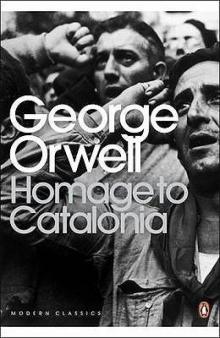 Homage to Catalonia
Homage to Catalonia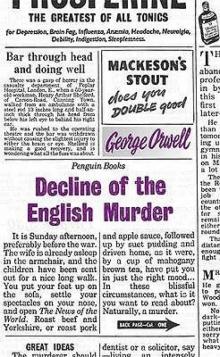 Decline of the English Murder
Decline of the English Murder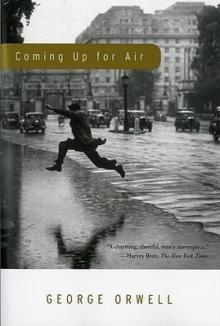 Coming Up for Air
Coming Up for Air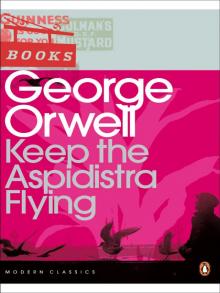 Keep the Aspidistra Flying
Keep the Aspidistra Flying Facing Unpleasant Facts: Narrative Essays
Facing Unpleasant Facts: Narrative Essays The Complete Novels of George Orwell
The Complete Novels of George Orwell All Art Is Propaganda: Critical Essays
All Art Is Propaganda: Critical Essays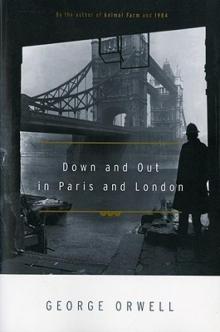 Down and Out in Paris and London
Down and Out in Paris and London Why I Write
Why I Write Nineteen Eighty-Four
Nineteen Eighty-Four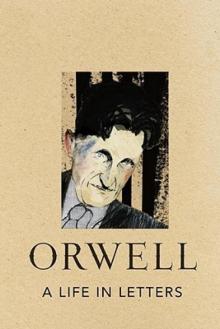 A Life in Letters
A Life in Letters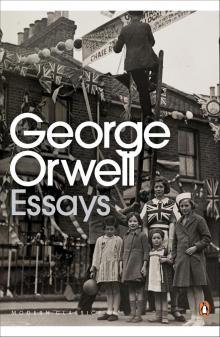 Essays
Essays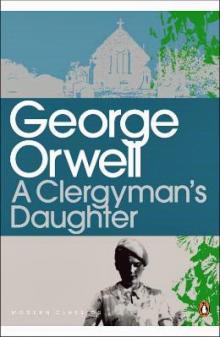 A Clergyman's Daughter
A Clergyman's Daughter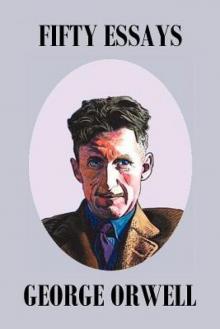 Fifty Orwell Essays
Fifty Orwell Essays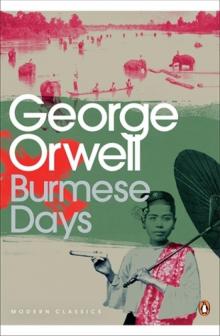 Burmese Days
Burmese Days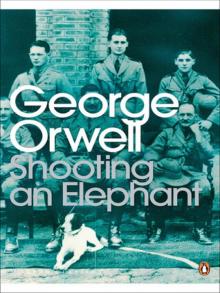 Shooting an Elephant
Shooting an Elephant 1984 (Penguin)
1984 (Penguin)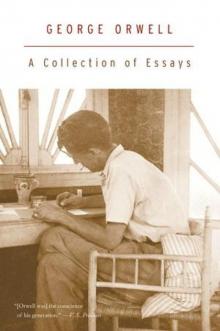 A Collection of Essays
A Collection of Essays 1984
1984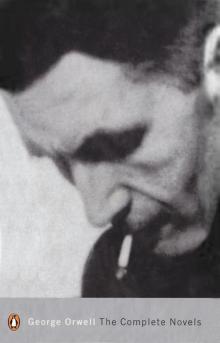 The Complete Novels
The Complete Novels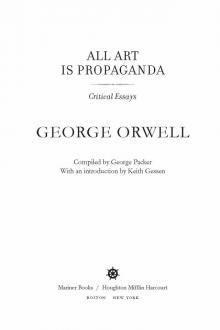 All Art Is Propaganda
All Art Is Propaganda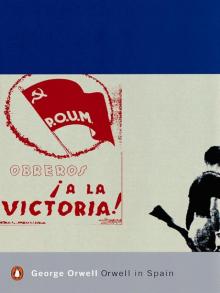 Orwell in Spain
Orwell in Spain Animal Farm: A Fairy Story
Animal Farm: A Fairy Story Animal Farm and 1984
Animal Farm and 1984